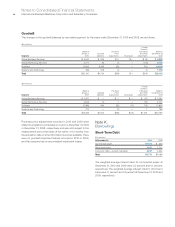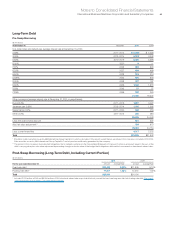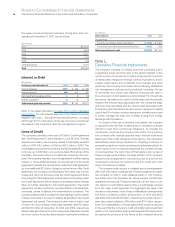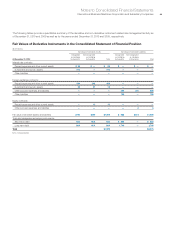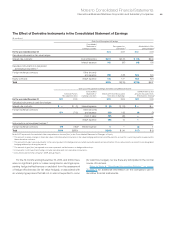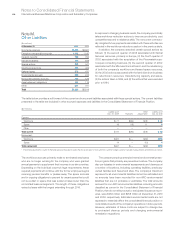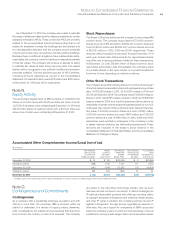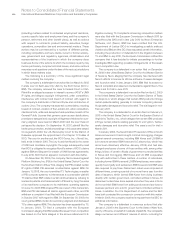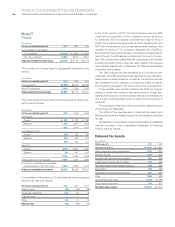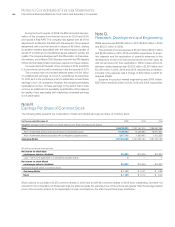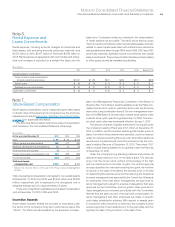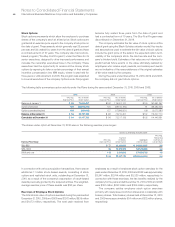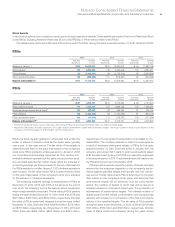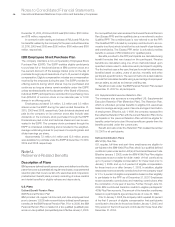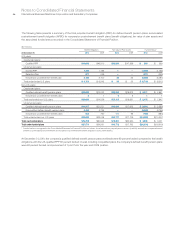IBM 2010 Annual Report Download - page 106
Download and view the complete annual report
Please find page 106 of the 2010 IBM annual report below. You can navigate through the pages in the report by either clicking on the pages listed below, or by using the keyword search tool below to find specific information within the annual report.Notes to Consolidated Financial Statements
International Business Machines Corporation and Subsidiary Companies104
litigation involving T3. Complaints concerning competition matters
were also filed with the European Commission in March 2010 by
TurboHercules SAS and in late July 2010 by Neon Enterprise
Software, LLC (Neon). IBM has been notified that the U.S.
Department of Justice (DOJ) is investigating possible antitrust
violations by IBM, and the DOJ has requested certain information,
including the production of materials from the litigation between
T3 and IBM. In July 2010, the European Commission notified the
company that it has decided to initiate proceedings to further
investigate IBM regarding possible infringements of European
Union competition law.
The company is a defendant in an action filed on December
14, 2009 in the United States District Court for the Western District
of Texas by Neon, alleging that the company has interfered with
Neon’s efforts to license its zPrime software. It seeks damages
and injunctive relief. In late January 2010, IBM filed its answer to
Neon’s complaint and asserted counterclaims against Neon. The
case is set for trial in June 2011.
The company is a defendant in an action filed on April 2, 2009
in the United States District Court for the Eastern District of Texas
by Acqis LLC, which alleges that certain IBM products infringe
certain patents relating generally to modular computing devices.
Acqis seeks damages and injunctive relief. The trial began in mid-
February 2011.
The company is a defendant in an action filed on February 5,
2010 in the United States District Court for the Eastern District of
Virginia by TecSec, Inc., which alleges that certain IBM products
infringe certain patents relating generally to encryption. TecSec
seeks damages and injunctive relief. The case is set for trial in
March 2011.
In January 2004, the Seoul District Prosecutors Office in South
Korea announced it had brought criminal bid-rigging charges
against several companies, including IBM Korea and LG IBM (a
joint venture between IBM Korea and LG electronics, which has
since been dissolved, effective January, 2005) and had also
charged employees of some of those entities with, among other
things, bribery of certain officials of government-controlled entities
in Korea and bid rigging. IBM Korea and LG IBM cooperated
fully with authorities in these matters. A number of individuals,
including former IBM Korea and LG IBM employees, were subse-
quently found guilty and sentenced. IBM Korea and LG IBM were
also required to pay fines. Debarment orders were imposed at
different times, covering a period of no more than a year from the
date of issuance, which barred IBM Korea from doing business
directly with certain government-controlled entities in Korea. All
debarment orders have since expired and when they were in force
did not prohibit IBM Korea from selling products and services to
business partners who sold to government-controlled entities in
Korea. In addition, the U.S. Department of Justice and the SEC
have both contacted the company in connection with this matter.
In March 2008, the company received a request from the SEC for
additional information.
The company is a defendant in numerous actions filed after
January 1, 2008 in the Supreme Court for the State of New York,
county of Broome, on behalf of hundreds of plaintiffs. The complaints
allege numerous and different causes of action, including for
(including matters related to contested employment decisions,
country-specific labor and employment laws, and the company’s
pension, retirement and other benefit plans), as well as actions
with respect to contracts, product liability, securities, foreign
operations, competition law and environmental matters. These
actions may be commenced by a number of different parties,
including competitors, partners, clients, current or former employ-
ees, government and regulatory agencies, stockholders and
representatives of the locations in which the company does
business. Some of the actions to which the company is party may
involve particularly complex technical issues, and some actions
may raise novel questions under the laws of the various jurisdictions
in which these matters arise.
The following is a summary of the more significant legal
matters involving the company.
The company is a defendant in an action filed on March 6, 2003
in state court in Salt Lake City, Utah by the SCO Group (SCO v.
IBM). The company removed the case to Federal Court in Utah.
Plaintiff is an alleged successor in interest to some of AT&T’s UNIX
IP rights, and alleges copyright infringement, unfair competition,
interference with contract and breach of contract with regard to
the company’s distribution of AIX and Dynix and contribution of
code to Linux. The company has asserted counterclaims, including
breach of contract, violation of the Lanham Act, unfair competition,
intentional torts, unfair and deceptive trade practices, breach of the
General Public License that governs open source distributions,
promissory estoppel and copyright infringement. Motions for sum-
mary judgment were heard in March 2007, and the court has not
yet issued its decision. On September 14, 2007, plaintiff filed for
bankruptcy protection, and all proceedings in this case were stayed.
On August 25, 2009, the U.S. Bankruptcy Court for the District of
Delaware approved the appointment of a Chapter 11 Trustee of
SCO. The court in another suit, the SCO Group, Inc. v. Novell, Inc.,
held a trial in March 2010. The jury found that Novell is the owner
of UNIX and UnixWare copyrights; the judge subsequently ruled
that SCO is obligated to recognize Novell’s waiver of SCO’s claims
against IBM and Sequent for breach of UNIX license agreements.
In July 2010, SCO filed an appeal in connection with this matter.
On November 29, 2006, the company filed a lawsuit against
Platform Solutions, Inc. (PSI) in the United States District Court for
the Southern District of New York, alleging that PSI violated certain
IP rights of IBM. PSI asserted counterclaims against IBM. On
January 11, 2008, the court permitted T3 Technologies, a reseller
of PSI computer systems, to intervene as a counterclaim-plaintiff.
T3 claimed that IBM violated certain antitrust laws by refusing to
license its patents and trade secrets to PSI and by tying the sales
of its mainframe computers to its mainframe operating systems.
On June 30, 2008, IBM acquired PSI. As a result of this transaction,
IBM and PSI dismissed all claims against each other, and PSI
withdrew a complaint it had filed with the European Commission
in October 2007 with regard to IBM. On September 30, 2009, the
court granted IBM’s motion for summary judgment and dismissed
T3’s claims against IBM. This decision has been appealed by T3.
In January 2009, T3 filed a complaint with the European
Commission alleging that IBM violated European Union competition
law based on the facts alleged in the above-referenced U.S.


